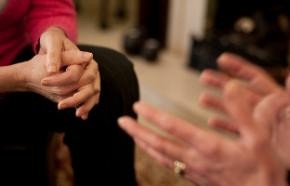Yes, we can talk about this

North Carolina voters go to the polls today, and the race that will make all the headlines doesn’t have a candidate. On the ballot is a constitutional amendment defining marriage between one man and one woman as the only legal domestic union recognized by the state.
I’m against the amendment--a popular view here in Greensboro. The city council passed a resolution opposing it. Light blue “Vote Against” yard signs dot the neighborhood around our church.
Across the state, opinions are more varied. But polls show that support for the amendment has been falling, especially as voters learn about its possible implications for child custody cases and domestic violence protections for unmarried couples.
The debate has gotten heated. The opinion page of our local paper has been filled with letters for and against. In a video making the rounds recently, a supporter of the amendment uses a shotgun to shoot a hole through an opposition sign near his house. A local television station hosted a panel discussion that was more of a series of talking points people on either side lobbed past each other.
In this climate, it’s no surprise that my congregation is hesitant to talk about such things. These are good, faithful folks, whose generosity and compassion give me hope for the world. Feeding the hungry and caring for the sick--they’ve got that down. But engaging larger, potentially divisive questions--about how we live with one another, about how the structures of society affect how we love our neighbors? Those are waters they’ve not often waded into.
I can understand where they’re coming from. I’ve never been an activist. I’ll sign a petition here or there, but you won’t usually find me at a rally. There aren’t any bumper stickers on my car.
But I got fired up about this amendment, its pointlessness and meanness, and I found myself going to meetings of other clergy who were organizing the opposition. I reposted articles on Facebook. I even put a yard sign up in front of my house.
And--gasp!--I talked about it at church.
After some discussion with my leaders, I wrote a letter to the congregation, sharing my convictions about the amendment and inviting them to join me for a conversation.
I wasn’t sure who would come. I went back and forth between anticipating a huge fight and a dull conversation among people who all agreed already.
There was a palpable tension as people came in and found seats. We made polite small talk. Someone (maybe me) made a lousy joke, and everyone laughed awkwardly. I could tell that we were all trying to size one another up--were they for or against? It would have been easier if we’d sat on different sides of the room, or worn name tags declaring our positions.
Once we got started—after a reminder that our goal was conversation, not persuasion—the discussion was large and rambling. What was this amendment all about? What’s really going to happen if it passes? How do we know who’s telling the truth? What do we do with those scriptures that use the word abomination? How in the world do we talk about this at church?
We didn’t solve anything. I don’t think anybody’s mind was changed. We left with a list of questions for another time.
But by the end of the conversation, we were all breathing a little easier as we came to the realization that we can talk about this at church. We can—and should—talk about things we thought were taboo. We can disagree with people we care about and still be friends when we’re done. We ended, in good church-meeting form, with a prayer.
Afterward, a couple of people said to me that they were afraid they’d been too pushy. But what I experienced was a whole lot of courageous speaking and graceful listening. A particularly nice moment came when a woman who was clearly in the minority in the room voiced her opinion and another participant--who couldn’t have disagreed more--thanked her for sharing.
I hope the amendment fails today. But whatever happens, I’m grateful to know that tomorrow, the people at my church will still be able to talk to one another.





